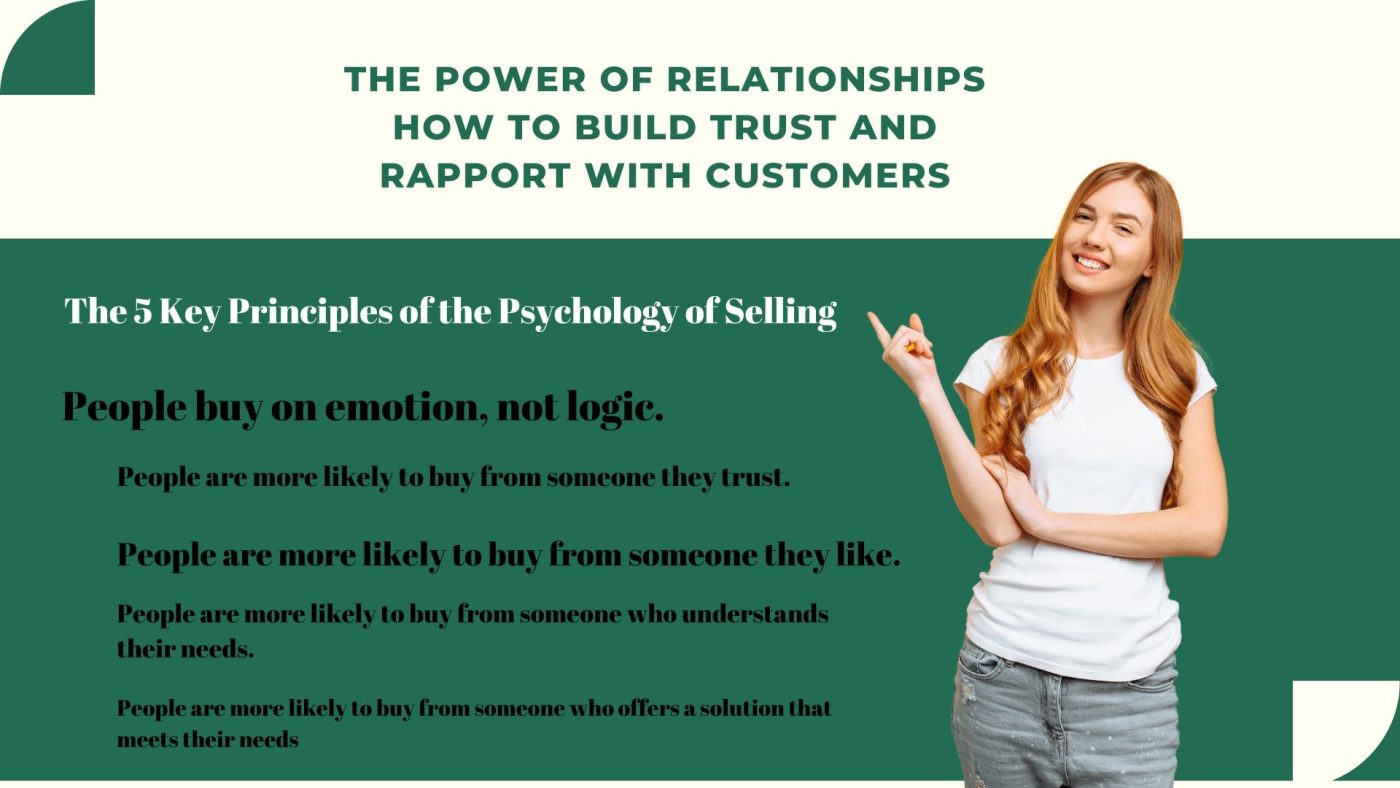The power of relationships How to build trust and rapport with customers
Relationships are at the heart of successful sales. By building strong relationships with customers, salespeople can create a sense of trust and rapport that can lead to repeat business and referrals. So let’s figure out The power of relationships How to build trust and rapport with customers
The Psychology of Selling
Introduction
In order to be successful in sales, it is important to understand the psychology of selling. The psychology of selling is the study of how people make decisions and how they are persuaded. By understanding the psychology of selling, salespeople can better understand their customers and their needs, and they can develop more effective sales strategies.
The 5 Key Principles of the Psychology of Selling
There are five key principles that underpin the psychology of selling. These principles are:
1. People buy on emotion, not logic.
Most people make decisions based on their emotions, not their logic. This is why it is important for salespeople to connect with their customers on an emotional level. They can do this by building rapport, understanding the customer’s needs, and demonstrating empathy.
Emotional Appeals
One way to connect with customers on an emotional level is to use emotional appeals. Emotional appeals are statements that appeal to the customer’s emotions, such as their fear, desire, or sense of belonging. For example, a salesperson might use an emotional appeal to sell a new car by saying, “This car will make you feel safe and secure.”
Rapport Building
Another way to connect with customers on an emotional level is to build rapport. Rapport is a feeling of trust and connection between two people. Salespeople can build rapport by being friendly, approachable, and genuine. They can also build rapport by finding common ground with the customer.
Empathy
Empathy is the ability to understand and share the feelings of another person. Salespeople who demonstrate empathy are more likely to connect with their customers on an emotional level. They can do this by listening carefully to the customer and asking questions to understand their needs.
2. People are more likely to buy from someone they trust.
Trust is essential in any relationship, including the relationship between a salesperson and a customer. Salespeople can build trust by being honest, reliable, and transparent. They can also build trust by providing excellent customer service.
Honesty
Honesty is essential for building trust. Salespeople who are honest with their customers are more likely to be trusted. They should avoid making false promises or exaggerating the benefits of their products or services.
Reliability
Reliability is also important for building trust. Salespeople who are reliable are more likely to be trusted. They should keep their promises and follow through on their commitments.
Transparency
Transparency is the willingness to be open and honest about your products or services. Salespeople who are transparent are more likely to be trusted. They should be honest about the limitations of their products or services.
Excellent Customer Service
Excellent customer service is another way to build trust. Salespeople who provide excellent customer service are more likely to be trusted. They should be responsive to customer inquiries and complaints.

3. People are more likely to buy from someone they like.
People are more likely to do business with people they like. Salespeople can increase their likability by being friendly, approachable, and genuine.
Friendliness
Friendliness is important for increasing likability. Salespeople who are friendly are more likely to be liked. They should smile, make eye contact, and use positive language.
Approachability
Approachability is also important for increasing likability. Salespeople who are approachable are more likely to be liked. They should be open to conversation and make themselves available to help customers.
Genuineness
Genuineness is essential for increasing likability. Salespeople who are genuine are more likely to be liked. They should be themselves and avoid being fake or manipulative.
4. People are more likely to buy from someone who understands their needs.
Salespeople who take the time to understand their customers’ needs are more likely to close deals. Salespeople can understand their customers’ needs by asking questions, listening carefully, and observing the customer’s behavior.
Questioning
One way to understand your customers’ needs is to ask questions. Salespeople should ask open-ended questions that encourage the customer to talk about their needs.
Listening
Another way to understand your customers’ needs is to listen carefully. Salespeople should listen to what the customer is saying, both verbally and nonverbally.
Observing
Salespeople can also learn about their customers’ needs by observing their behavior. Salespeople should pay attention to what the customer is looking at, how they are interacting with the product or service, and what they are saying.
5. People are more likely to buy from someone who offers a solution that meets their needs.
Salespeople who offer solutions that meet their customers’ needs are more likely to close deals. Salespeople can identify solutions that meet their customers’ needs by understanding the customer’s needs and by offering a variety of options.
Solution-focused selling
Solution-focused selling is a sales approach that focuses on identifying and addressing the customer’s needs. Salespeople who use a solution-focused approach listen carefully to the customer and then work with the customer to develop a solution that meets their needs.
Variety of options
Salespeople should offer a variety of options to their customers. This shows that the salesperson is interested in meeting the customer’s needs and that they are not trying to push a particular product or service.
Examples
Here are some examples of how the principles of the psychology of selling can be applied in the real world:
-
A salesperson who is selling a new car might start by building rapport with the customer by talking about their interests. The salesperson might then ask questions to understand the customer’s needs. For example, the salesperson might ask the customer what they are looking for in a car. Once the salesperson understands the customer’s needs, they can present the car in a way that meets those needs. The salesperson might also offer a test drive or other incentives to help the customer make a decision.
-
A salesperson who is selling a new software program might start by demonstrating the program to the customer. The salesperson might then ask questions to understand the customer’s needs. For example, the salesperson might ask the customer how they use their current software program and what they are looking for in a new program. Once the salesperson understands the customer’s needs, they can present the program in a way that meets those needs. The salesperson might also offer a free trial or other incentives to help the customer make a decision.
Practice Methods
There are a number of ways to practice the principles of the psychology of selling. Here are a few tips:
-
Role-play with friends or family. This is a great way to practice your sales skills and get feedback from others.
-
Join a sales club or organization. This is a great way to connect with other salespeople and learn from their experiences.
-
Attend sales training courses. This is a great way to learn the latest sales techniques and strategies.
Measurement Scale
There are a number of ways to measure the effectiveness of the psychology of selling. Here are a few metrics:
-
Closing rate: This is the percentage of customers who buy after being contacted by a salesperson.
-
Customer satisfaction: This is a measure of how satisfied customers are with the products or services they purchased.
-
Salesperson satisfaction: This is a measure of how satisfied salespeople are with their jobs.
Conclusion
By understanding the psychology of selling, salespeople can increase their chances of success. Salespeople who understand the psychology of selling can better connect with their customers, build trust, and close deals.
Additional Tips
In addition to the five key principles discussed above, there are a few other tips that can help salespeople improve their sales skills:
-
Be positive and enthusiastic. People are more likely to be attracted to and trust someone who is positive and enthusiastic.
-
Be prepared. Do your research and learn as much as you can about your product or service.
-
Be persistent. Don’t give up if you don’t close a deal right away. Keep trying and eventually, you will succeed.
By following these tips, salespeople can increase their chances of success in the sales field. The power of relationships How to build trust and rapport with customers


Pingback: The art of discovery How to understand customer needs - Finance Wise Insights
Pingback: The power of presentations How to effectively communicate your message - Finance Wise Insights